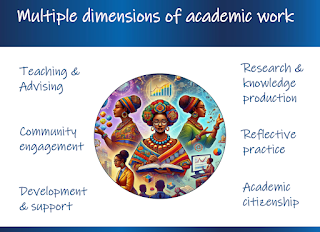In a complex and changing academic context, early career academics must be aware of the many dimensions that academic work involves. In whatever discipline or field you are building your career, there are global challenges that cannot be ignored, alongside global efforts to address these challenges, such as the UN SDGs. We are in the midst of the threat of climate change wreaking havoc across the Global South, and just survived one of the most deadly global pandemics in human history; there are massive technological advancement and an incisive digital transformation underway with AI offering huge opportunities as well as challenges and threats. In the midst of this, academic work must provide equitable quality education and contribute to deep societal transformation, especially in post-colonial and post-conflict societies in the Global South. In short: we need a new generation of academics who can provide transformative leadership across the multiple functions of academic work; academic game-changers.
What are those dimensions?
Among the top-of-mind academic work functions are:
- Teaching & Advising
- Community engagement
- Development & support
- Research & knowledge production
- Reflective practice
- Academic citizenship
In the dimension of research, knowledge production and reflective practice (and its interrelation with community engagement, as well as teaching, advising and academic citizenship,) developing an identity as researcher-academic is becoming increasingly important. My argument is that the conception of the 'teacher-academic' of previous centuries has given way to that of the 'researcher-academic' in the last fifty years or so, increasingly ubiquitously, not anymore in the exception of the 'star research professor' but it is the new normal.
In this new normal, the 'researcher-academic' is a professor who takes the leap into the 'fourth dimension' - leading in knowledge creation, policy influence, partnerships, transformation and sustainability.
This transformation of the academic work and the workplace, there are naturally tensions. In the 'fourth dimension' - determining knowledge production - the three-dimensional professor of old becomes a digitally-enhanced, natural and artificial intelligence-connected, multiverse being; but tensions abound. I have not even reflected on many of them related to the digital and AI connection yet, but rather on some of the 'old' vs. 'new' tensions, like at the very basic level, of taking the leap from scholar to researcher; tensions between type 1 and type 2 knowledges; collaboration (with other human and machine colleagues) or working in the hermetically, and so forth.
The fourth dimension is also the one where dreams become reality in ways that a 20th century steel and mortar generation still feels hard to grapple with; the creation of international consortia, policy laboratories, global research studios, and so forth, has become cost-neutral. The most precious resource remains time (money has always been a distraction)!
And like MS and others have long discovered, the true value is not in owning the application, but developing and maintaining the platform. Hence, a key issue - undervalued but of paramount importance - is to be in the centre of the knowledge process as owner and editor of knowledge platforms, like scholarly journals.
I'll leave this here; many of these thoughts are ready for building up, critiquing, developing. I'll love to hear from you.
(A detailed version of this discourse was delivered by me as keynote at the Research Indaba, Tshwane University of Technology, Pretoria, 11 October 2024.)


